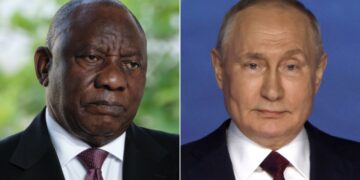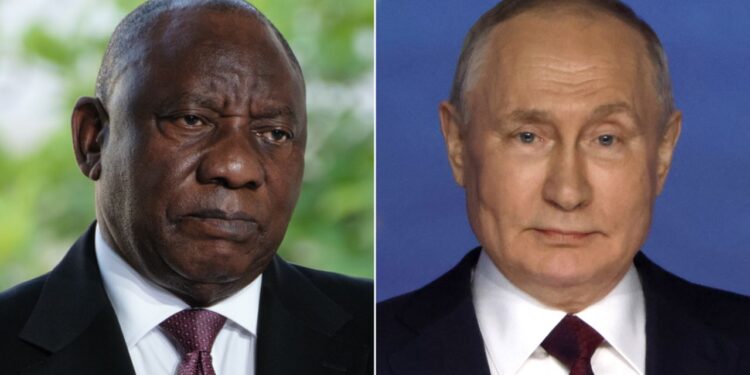By Ebi Kesiena
The war in Ukraine must end, South Africa’s President Cyril Ramaphosa has told Russia’s leader Vladimir Putin.
President Ramaphosa’s remarks came as he met Mr Putin in St Petersburg on Saturday as part of a peace mission with six other African countries.
Ukrainian President Volodymr Zelensky told the delegation on Friday that he would not enter talks with Russia while they occupied Ukrainian land.
While Putin told the African leaders Ukraine had always refused talks.
At the meeting in St Petersburg, Mr Ramaphosa also called for both parties to return their prisoners of war, and said children removed by Russia should be returned home.
Mr Putin has been charged with war crimes by the International Criminal Court over the forced removal of hundreds of Ukrainian children from their families during Russia’s occupation of Ukraine.
As the African delegation called for the return of children to their families, Mr Putin interrupted their speech and claimed Russia was protecting them.
“Children are sacred. We moved them out of the conflict zone, saving their lives and health”, he said. The UN said they have evidence of the illegal transfer of hundreds of Ukrainian children to Russia.
Mr Ramaphosa also warned Mr Putin of the impacts of the war on Africa, and said it should be settled by diplomacy.
“The war cannot go on forever. All wars have to be settled and come to an end at some stage,” he said. “And we are here to communicate a very clear message that we would like this war to be ended.”
The war has severely restricted the export of grain from Ukraine and fertiliser from Russia, which has affected African countries in particular and intensified global food insecurity.
But Mr Putin blamed the West for the grain crisis, not the war in Ukraine, as he said only 3% of the grain exports permitted under a UN-sponsored deal to ensure its safe passage through the Black Sea had gone to the worlds poorest countries.
He also praised what he described as Africa’s balanced position on the war.
The African delegation, made up of representatives from South Africa, Egypt, Senegal, Congo-Brazzaville, Comoros, Zambia, and Uganda has been specifically designed for breadth and balance, with members from different parts of Africa with different views on the conflict.
South Africa and Uganda are seen as leaning towards Russia, while Zambia and Comoros are closer to the West, while Egypt, Senegal and Congo-Brazzaville have remained largely neutral.



































